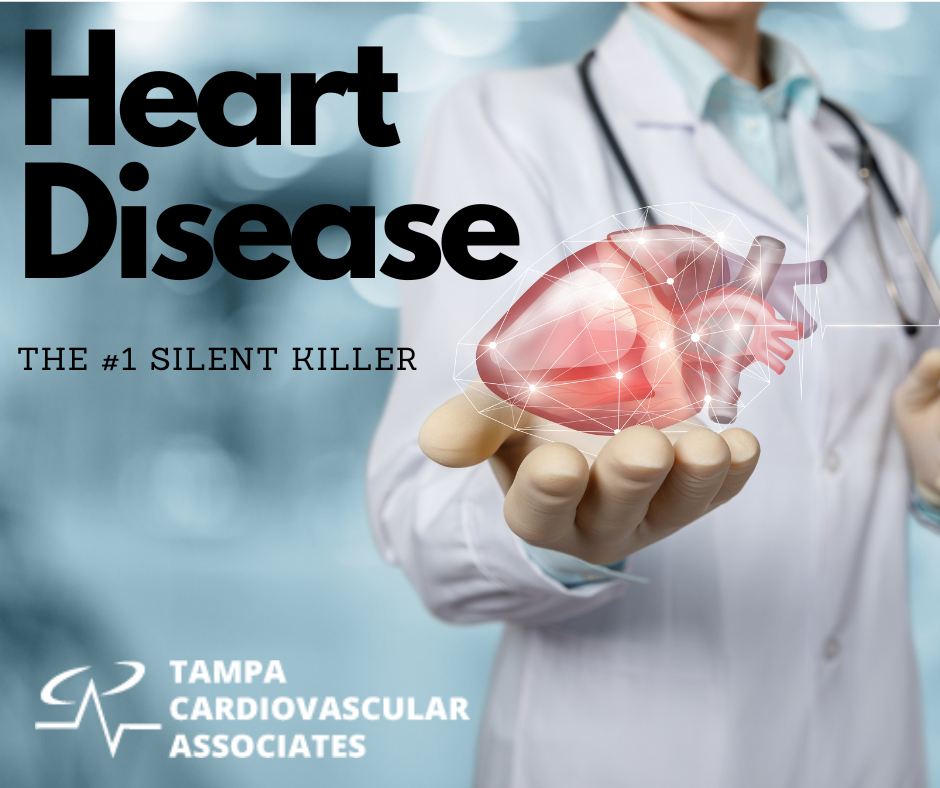Heart Disease Remains the #1 Cause of Death
Posted by: Tampa Cardio
On: February 21, 2023

Heart disease remains the number 1 cause of death in the USA and globally. It is responsible for 16% of the world’s deaths due to illness. It is followed closely by cancer.
It is for this reason we wanted to make everyone aware of the signs of heart disease and to remind you that it’s a good idea to get your heart health checked regularly.
WARNING SIGNS of HEART DISEASE
CHEST PAIN – While there are many causes that have nothing to do with the heart, chest pain is still the most common symptom of impaired blood flow to the heart or a heart attack. This type of chest pain is called angina.
Chest pain can occur when the heart is not getting enough oxygen or blood. The intensity of the pain does not always correlate to how severe the problem is.
- Ranges from crushing pain to mild discomfort
- Squeezing, sharp, or burning pain
- Pain is felt in the breastbone, neck, arms, stomach, jaw, or upper back
- Chest pain from angina often occurs with activity or emotion and goes away with rest or nitroglycerin
- Indigestion can also cause chest pain
You may also experience
- Fatigue
- Shortness of breath
- Weakness
- Change in skin color
- Extreme anxiety
- Fainting
- Lightheadedness
- Nausea or vomiting
- Palpitations
- Shortness of breath
- Sweating
SHORTNESS OF BREATH – When the heart isn’t pumping blood as well as it should, blood can back up in the veins that go from the lungs to the heart. Fluid leaks into the lungs and causes shortness of breath.
COUGH OR WEEZE – You may cough up mucus that is bloody or pink. A cough that doesn’t go away can be a sign as well.
EDEMA – Swelling in your lower legs is a sign of a heart problem. When your heart doesn’t work as well, blood flow slows and backs up in the veins in your legs. This causes fluid to build up in your tissues. Swelling may also be noticeable in the stomach area.
NARROWING OF BLOOD VESSELS – Vessels carry blood throughout the body. The narrowing may put you at a much higher risk for heart attack and stroke. This is due to cholesterol and plaque build-up.
- Aches and pains in the ankles, feet, or legs
- Symptoms appear during exercise and get better with rest
- Numbness in your legs or feet when you are at rest
- Your legs feel cold to the touch
CHRONIC FATIGUE – Fatigue may be a sign of heart trouble when:
- You feel much more tired than normal and it comes on suddenly. (It is common for women to feel severely tired before or during a heart attack)
- You feel so tired that you can’t function
- You have sudden, severe weakness
PALPITATIONS – If your heart can’t pump blood as well, it may beat faster to try to keep up.
Is It Time to see a cardiologist?
If you have any signs of heart disease, call your healthcare provider right away. Don’t wait to see if the symptoms go away or dismiss them.
Give Tampa Cardiovascular Associates a call at 813-975-2800 to schedule your appointment or visit online at www.tampacardio.com to learn more about the practice.
Call 911 IF:
- You have chest pain or other symptoms of a heart attack
- You think you may have lost consciousness
- You think you may be having a heart attack
- You have been diagnosed with angina and have chest pain that doesn’t go away after 5 minutes of rest or after taking nitroglycerine
- You become extremely short of breath
Posted by: Tampa Cardio
On: 21/02/2023
